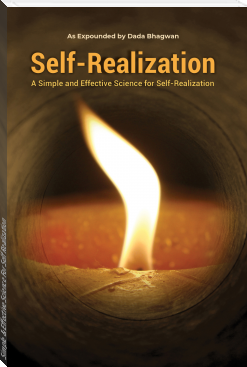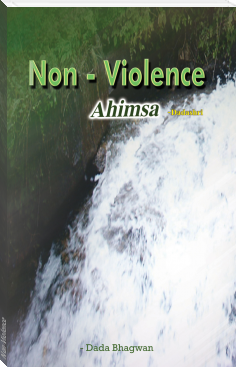Pratikraman: Freedom Through Apology & Repentance - Dada Bhagwan (best books to read for self improvement TXT) 📗

- Author: Dada Bhagwan
Book online «Pratikraman: Freedom Through Apology & Repentance - Dada Bhagwan (best books to read for self improvement TXT) 📗». Author Dada Bhagwan
As Expounded by Dada Bhagwan
Pratikraman
The Master key That Resolves All Conflicts
Abridged Version
Originally Compiled in Gujarati by: : Dr. Niruben Amin
Trimantra
The Three Mantras That Destroy All Obstacles in Life
Namo Vitaraagaya
I bow to the Ones who are absolutely free from all attachment and abhorrence
Namo Arihantanam
I bow to the living Ones who have annihilated all internal enemies of anger, pride, deceit and greed
Namo Siddhanam
I bow to the Ones who have attained the state of total and final liberation
Namo Aayariyanam
I bow to the Self-realized masters who impart the Knowledge of the Self to others
Namo Uvazzayanam
I bow to the Ones who have received the Knowledge of the Self and are helping others attain the same
Namo Loye Savva Sahunam
I bow to the Ones, wherever they may be, who have received the Knowledge of the Self
Eso Pancha Namukkaro
These five salutations
Savva Pavappanasano
Destroy all demerit karma
Mangalanam Cha Savvesim
Of all that is auspicious
Padhamam Havai Mangalam
This is the highest
Om Namo Bhagavate Vasudevaya
I bow to the Ones who have attained the absolute Self in human form
Om Namah Shivaya
I bow to all human beings who have become instruments for the salvation of the world
Jai Sat Chit Anand
Awareness of the Eternal is Bliss
Books of Akram Vignan of Dada Bhagwan
1. Adjust Everywhere
2. Anger
3. Aptavani - 1
4. Aptavani - 2
5. Aptavani - 4
6. Aptavani - 5
7. Aptavani - 6
8. Aptavani - 8
9. Aptavani - 9
10. Autobiography of Gnani Purush A.M.Patel
11. Avoid Clashes
12. Brahmacharya : Celibacy Attained With Understanding
13. Death : Before, During and After...
14. Flawless Vision
15. Generation Gap
16. Harmony In Marriage
17. Life Without Conflict
18. Money
19. Noble Use of Money
20. Non-Violence
21. Pratikraman : The Master Key That Resolves All Conflicts ( Abridged & Big Volume)
22. Pure Love
23. Right Understanding to Help Others
24. Science of Karma
25. Science of Speech
26. The Current Living Tirthankara Shree Simandhar Swami
27. Simple and Effective Science for Self-Realization
28. The Essence of All Religion
29. The Fault Is of the Sufferer
30. The Guru and the Disciple
31. The Hidden Meaning of Truth and Untruth
32. The Practice of Humanity
33. Trimantra
34. Whatever Has Happened Is Justice
35. Who Am I ?
36. Worries
‘Dadavani’ Magazine is published every month in English
Who Is Dada Bhagwan?
In June 1958, around 6 o’clock one evening, amidst the hustle and bustle of the Surat railway station while seated on a bench, ‘Dada Bhagwan’ manifested completely within the sacred bodily form of Ambalal Muljibhai Patel. Nature revealed a remarkable phenomenon of spirituality! In the span of an hour, the vision of the universe was unveiled to him! Complete clarity for all spiritual questions such as, ‘Who are we? Who is God? Who runs the world? What is karma? What is liberation?’ etc. was attained.
What He attained that evening, He imparted to others through his original Scientific experiment (Gnan Vidhi) in just two hours! This has been referred to as the Akram path. Kram means to climb up sequentially, step-by-step while Akram means step-less, a shortcut, the elevator path!
He, himself, would explain to others who Dada Bhagwan is by saying, “The one visible before you is not Dada Bhagwan. I am the Gnani Purush and the One who has manifested within is Dada Bhagwan who is the Lord of the fourteen worlds. He is also within you, and within everyone else too. He resides unmanifest within you, whereas here [within A. M. Patel], He has manifested completely! I, myself, am not God (Bhagwan); I also bow down to the Dada Bhagwan who has manifest within me.”
*****
The Current Link to Attain Self-Realization
After attaining the Knowledge of the Self in 1958, absolutely revered Dada Bhagwan (Dadashri) traveled nationally and internationally to impart spiritual discourse and Self-realization to spiritual seekers.
During his lifetime itself, Dadashri had given the spiritual power to Pujya Dr. Niruben Amin (Niruma) to bestow Self-realization to others. In the same way, after Dadashri left his mortal body, Pujya Niruma conducted spiritual discourses (satsang) and imparted Self-realization to spiritual seekers, as an instrumental doer. Dadashri had also given Pujya Deepakbhai Desai the spiritual power to conduct satsang. At present, with the blessings of Pujya Niruma, Pujya Deepakbhai travels nationally and internationally to impart Self-realization as an instrumental doer.
After Self-realization, thousands of spiritual seekers prevail in a state free from bondage and dwell in the experience of the Self, whilst carrying out all their worldly responsibilities.
*****
Note About This Translation
The Gnani Purush, Ambalal M. Patel, also commonly known as ‘Dadashri’ or ‘Dada’, gave spiritual discourses that were in the form of answers to questions asked by spiritual aspirants. These discourses were recorded and compiled into books by Pujya Dr. Niruben Amin in the Gujarati language.
Dadashri had said that it would be impossible to translate His satsangs and the Knowledge about the Science of Self-realization word for word into other languages, because some of the meaning would be lost in the process. Therefore, in order to understand precisely the Akram Science of Self-realization, He stressed the importance of learning Gujarati.
However, Dadashri did grant His blessings to translate His words into other languages so that spiritual seekers could benefit to a certain degree and later progress through their own efforts. This book is not a literal translation, but great care has been taken to preserve the essence of His original message.
Spiritual discourses have been and continue to be translated from Gujarati. For certain Gujarati words, several translated words or even sentences are needed to convey the meaning, hence many Gujarati words have been retained within the translated text for better understanding. Where the Gujarati word is used for the first time, it is italicized, followed by a translation explaining its meaning in parenthesis. Subsequently, only the Gujarati word is used in the text that follows. This serves a two-fold benefit; firstly, ease of translation and reading, and secondly, make the reader more familiar with the Gujarati words, which is critical for a deeper understanding of this spiritual Science. The content in square brackets provides further clarity regarding the matter, which is not present in the original Gujarati content.
This is a humble attempt to present to the world, the essence of His Knowledge. While reading this translation, if there is any contradiction or discrepancy, then it is the mistake of the translators and the understanding of the matter should be clarified with the living Gnani to avoid misinterpretation.
*****
Special Note to the Reader
The Self is the Soul (Atma) within all living beings.
The term pure Soul is used by the Gnani Purush for the awakened Self, after the Gnan Vidhi. The word Self, with an uppercase ‘S’, refers to the awakened Self which is separate from the worldly-interacting self, which is written with a lowercase ‘s’.
Wherever Dadashri uses the term ‘we’, ‘us’, or ‘our’, He is referring to Himself, the Gnani Purush.
Similarly, the use of You or Your in the middle of a sentence, with an uppercase first letter, or ‘You’, ‘Your’ in single quotes at the beginning of the sentence, refers to the state of the awakened Self or Pragnya. This is an important distinction for the correct understanding of the difference between the awakened Self and the worldly-interacting self.
Wherever the name ‘Chandubhai’ is used, the reader should substitute his or her name and read the matter accordingly.
The masculine third person pronoun ‘he’ and likewise the object pronoun ‘him’ have been used for the most part throughout the translation. Needless to say, ‘he’ includes ‘she’ and ‘him’ includes ‘her’.
For reference, a glossary of all the Gujarati words is either provided at the back of the book or available on our website at: http://www.dadabhagwan.org/books-media/glossary/
*****
Dedication
Atikramanoni ananti vanazaar;
With the infinite mass of atikraman;
Karmoni pal pal bandhati haarmaal!
The chains of karma are bound each and every moment!
Moksha to kya, dharmey niraadhar;
Forget liberation, with no scope of even religion;
Kon chadhave margasya pagathaar?
Who would take one ahead on the stages of liberation?
Akram Vignani Dada taaranhaar;
The Akram Scientist Dada, the liberator;
Pratikramanu deedhu hathiyaar!
Gave the weapon of pratikraman!
Moksha margno kharo saathidaar;
A true friend on the path of liberation;
Taaj bani shobhaavyo Dada darbaar!
As a crown, it adorns Dada’s court!
Pratikraman sankshiptma kriyakaar;
The Pratikraman abridged book is effective;
Todave bandhana mool ahamkaar!
It breaks the bondage caused by the ego, which is at the root!
Pratikraman vignan atre saakaar;
The Science of pratikraman expressed here in visible form;
Samarpan jagne, machaav jay jaykaar!
Offered to the world, may it dazzle the world!
*****
Editorial
Should there not be some tried-and-true remedy for those who are sincerely trying to staunchly curtail kashay (anger-pride-deceit-greed) that vex each and every moment, in order to move forward along the path of liberation? Through what understanding can the grossest to the subtlest conflict be averted? How do we prevent ourselves from being hurt or hurting others? What is the solution to restrain the bombardment of kashay, or how do we stop them from recurring? So many religious rituals have been carried out, chanting and penance, fasting, meditation, and other rituals, nevertheless, why don’t the faults that end up happening through the mind-speech-body come to a halt? Why is inner peace not experienced? What should be done when on occasion our own faults are seen? How can they be removed? Some trustworthy means are certainly necessary to progress on the path of liberation, as well as to live worldly life with peace and happiness, with few kashay, and with the feeling of love, isn’t it? What have the Vitaraag Lords expounded to the world about the essence of religion? What is true dharmadhyan (virtuous internal state of being)? If one wishes to be absolved from demerit karma (paap), then is there any assured path for that? If there is, then why is it not evident?
One can attain an abundance of knowledge from the religious scriptures; nevertheless, why does the knowledge not prevail in daily life? Ascetics, saints, spiritual teachers, preachers give many sermons, but where do they fall short in attaining





Comments (0)